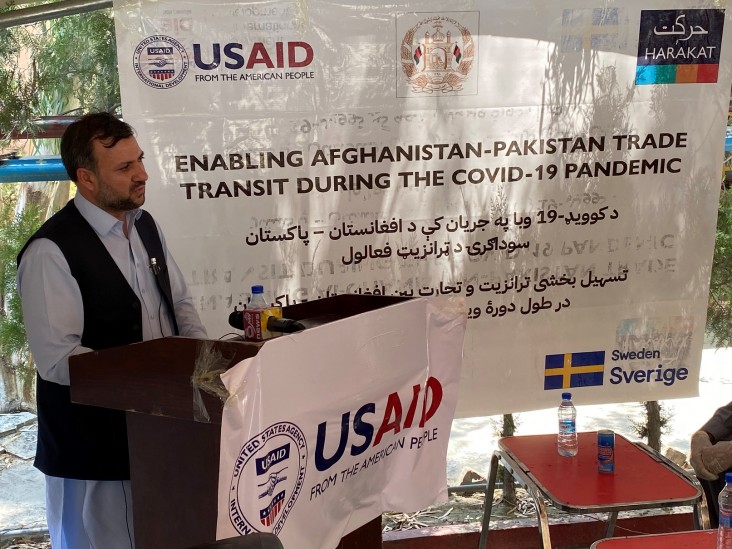Press Release Shim
Speeches Shim

For Immediate Release
Kabul, Afghanistan – Yesterday, the United States Agency for International Development (USAID), in partnership with Harakat Afghanistan Investment Climate Facility Organization, launched two interventions to improve the efficiency of the movement of goods at Afghanistan’s Torkham and Spin Boldak border posts with Pakistan. The joint effort will expedite the safe transit of cargo trucks, which declined from an average of 150 per day before COVID-19 to 100 per week. USAID and Harakat will revamp disinfection of vehicles and cargo at the two border posts before cargo is transferred from the Pakistan side of the border. The project also involves the establishment of a trans-shipment facility for containerized cargo at the Torkham border.
Maintaining trade flows during the COVID-19 pandemic is crucial to ensure access to essential food, medical supplies, and inputs for the economy that will protect jobs, support food security, and generate much needed foreign exchange.
“USAID recognizes that open borders are critical for improving Afghanistan’s regional connectivity and for the growth of Afghanistan’s agricultural sector. That’s why we are partnering with the Ministry of Commerce and Industry, Harakat, UKAID, and the Swedish Government and investing in agro-industrial development, trade transit, and trade policy through our Agricultural Value Chain program,” said Peter Natiello, USAID Mission Director for Afghanistan.
Harakat is an Afghan-based non-profit organization working to make it easier to do business in Afghanistan. Harakat will work closely with government, civil society, and private sector partners to increase trade efficiency at both borders, while convening public and private sector dialogues within Afghanistan and between Afghanistan and Pakistan. Their goal on this cross-border intervention is to ensure that Afghan enterprises have access to the Pakistani market and transit rights to global markets.
The intervention will expedite trade transit, while enabling Afghanistan to comply with the COVID-19 Trade Agreement with Pakistan, a first step towards opening borders to Afghan exports. With USAID support, Harakat will continue to lead the policy work in support of the Afghan government.
Mr. Noor Alam Hakimyar, Harakat CEO said, “We are glad to be part of this initiative. Afghanistan needs open borders with Pakistan for exports now more than ever due to the impact of COVID-19. Keeping the borders open will also avoid illegal trade and contribute to increased income through tariffs for the Afghan and Pakistani governments.”
The cross-border project will provide disinfection equipment and supplies, recruit, and train staff to use the equipment. USAID will fund this activity for an initial period of three months, seeking to support safe trade transit during the height of the COVID-19 pandemic.
The trans-shipment facility will consist of specialized equipment deployed to the Torkham border to transfer containerized cargo from Pakistani to Afghan trucks at the border, thereby reducing human contact and liability on the part of Afghan businesses.
The Afghan Chamber of Commerce and Investment (ACCI) CEO, Mr. Sayed Zaman Hashimi said, “We appreciate USAID’s and Harakat’s support on this important project. ACCI is ready to collaborate with Harakat under the existing memorandum of understanding to proactively engage with relevant stakeholders to find a sustainable solution to increase trade flow with Pakistan.”
Since 2002, USAID has supported Afghanistan to become a more self-reliant nation that can better partner with the U.S. Government on our national security goals. USAID partners with Afghanistan to ensure private sector led economic growth, to strengthen the country's nascent democracy, to advance the gains made by Afghan women, and to provide basic health and education services for all Afghans.
Related Press Releases
- U.S. Government Provides 100 Ventilators to the Government of Afghanistan to Support COVID-19 Response
- The United States and Afghanistan Sign Renewable Energy Deal
- The United States Provides More than $36.7 million for COVID-19 Response, and $90 million in expedited World Bank contributions to continue its Enduring Partnership with Afghanistan

Comment
Make a general inquiry or suggest an improvement.